2017/2018
Most events include video recordings and photos. Click on each event link to access.
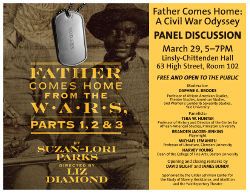
Father Comes Home: A Civil War Odyssey
This public panel, which marks the Yale Repertory Theatre’s production of Suzan-Lori Parks’s Father Comes Home from the Wars (Parts 1, 2 & 3), will discuss the ways in which theatre seeks to make sense of the present condition by mining America’s shifting conceptions of race and gender, its violent history of slavery, and its unfilled promises of freedom.
Moderated by Professor Daphne Brooks and bringing together historians, theatre studies scholars, and theater professionals, the panel will consider both Suzan-Lori Parks’s play as well as broader questions involving the ways in which playwrights and historians have creatively engaged with America’s past to better understand slavery, freedom, gender, and race.
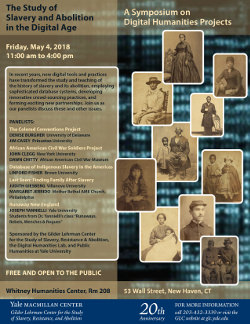
The Study of Slavery and Abolition in the Digital Age: A Symposium on Digital Humanities Projects
In recent years, new digital tools and practices have transformed the study and teaching of the history slavery and its abolition, employing sophisticated database systems, developing innovative crowd-sourcing practices, and forming exciting new partnerships. Join us on Friday, May 4th as our panelists discuss these and other issues.
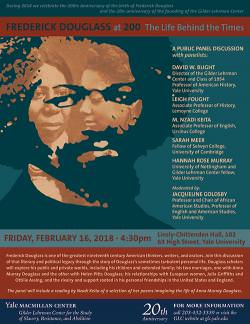 Panel Discussion: “Frederick Douglass at 200: The Life Behind the Times”
Panel Discussion: “Frederick Douglass at 200: The Life Behind the Times”
Join us for a panel discussion in honor of the 200th Anniversary of the birth of Frederick Douglass & the 20th anniversary of the founding of the Gilder Lehrman Center.
Frederick Douglass is one of the greatest American thinkers, writers, and orators of the nineteenth century. He is forever known in his words and his activism. Join the Gilder Lehrman Center for a discussion of that literary and political legacy, especially through the story of the personal life behind his turbulent times.
Scholars of Frederick Douglass will explore public and private dimensions of his life, including his daughter, three sons, and extended family; his two marriages, one of 44 years with Anna Murray Douglass and the other for 11 years with Helen Pitts Douglass; his relationships with European women, Julia Griffiths and Ottilie Assing; and his personal friendships, some rooted in fierce rivalry and some in enduring support, both in the United States and in England.
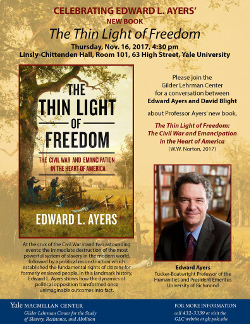 Book Talk: Ed Ayers, The Thin Light of Freedom: The Civil War and Emancipation in the Heart of America
Book Talk: Ed Ayers, The Thin Light of Freedom: The Civil War and Emancipation in the Heart of America
At the crux of America’s history stand two astounding events: the immediate and complete destruction of the most powerful system of slavery in the modern world, followed by a political reconstruction in which new constitutions established the fundamental rights of citizens for formerly enslaved people. Few people living in 1860 would have dared imagine either event, and yet, in retrospect, both seem to have been inevitable.
In a beautifully crafted narrative, Edward L. Ayers restores the drama of the unexpected to the history of the Civil War. He does this by setting up at ground level in the Great Valley counties of Augusta, Virginia, and Franklin, Pennsylvania, communities that shared a prosperous landscape but were divided by the Mason-Dixon Line. From the same vantage point occupied by his unforgettable characters, Ayers captures the strategic savvy of Lee and his local lieutenants, and the clear vision of equal rights animating black troops from Pennsylvania. We see the war itself become a scourge to the Valley, its pitched battles punctuating a cycle of vicious attack and reprisal in which armies burned whole towns for retribution. In the weeks and months after emancipation, from the streets of Staunton, Virginia, we see black and white residents testing the limits of freedom as political leaders negotiate the terms of readmission to the Union.
Ayers deftly shows throughout how the dynamics of political opposition drove these momentous events, transforming once unimaginable outcomes into fact. With analysis as powerful as its narrative, here is a landmark history of the Civil War.
Marìsa J. Fuentes - Refuse Bodies, Dispossessed Lives: The Ethical Practice of History

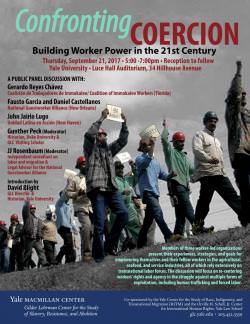 Panel Discussion: Confronting Coercion: Building Worker Power in the 21st Century
Panel Discussion: Confronting Coercion: Building Worker Power in the 21st Century
Panelists:
- Gerardo Reyes Chávez, Coalición de Trabajadores de Immokalee/ Coalition of Immokalee Workers (CIW): http://www.ciw-online.org/
- Fausto Garcia and Daniel Castellanos, National Guestworker Alliance: http://www.guestworkeralliance.org/about-nga/
- John Jairio Lugo, Unidad Latina en Acción: https://ulanewhaven.org/ula
